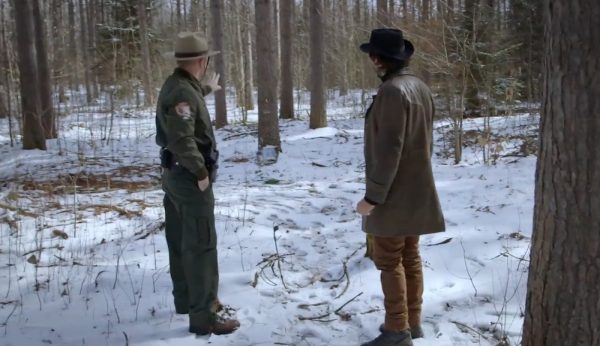Population Zero, 2016.
Directed by Julian T. Pinder.
SYNOPSIS:
Documentarian Julian Pinder attempts to unlock the mystery of ‘The Yellowstone Murders’, a seemingly senseless killing of three men in the Yellowstone National Park which involves a remarkable technicality within the United States Constitution…
Billed as a cross between The Blair Witch Project and Making a Murderer, Population Zero ends up being decidedly more the latter. A faux documentary about a fictional, national tabloid grabbing murder at the Yellowstone National Park, this tale features Canadian filmmaker Julian Pinder attempting to uncover the mystery behind a seemingly senseless triple homicide of three young men by a man with no motive for the crime. Here’s the rub, however – a glitch, a loophole in the United States Constitution involving the demarcation of states in relation to Yellowstone, means a man who admitted culpability immediately after the crime walked free without trial.
Pinder’s film is hung on this remarkable piece of legal injustice and pivots around his deeper investigation into how this occurred, how the victim’s families reacted, and why potentially the killer Dwayne Nelson did what he did. Cue an hour and twenty of wandering around snowy American states, and parts of Canada, looking for the truth.
Now let’s get one or two things out of the way first. Throwing Blair Witch in there as a comparison is almost pointless given bar the fact some bits take place in the woods, Population Zero is nothing like that seminal found footage horror film. It’s at best a thriller at times but almost entirely a true crime documentary (except it’s not true, but you get my drift). It’s also not Making a Murderer either, lacking that series’ forensic depth and, ultimately, it’s beguiling, chilling ambiguity (plus the fact Making a Murderer *is* a true story). Pinder wants this to have that resonance and depth and while his story does have, to an extent, the level of intrigue, it lacks the detail and substance.
For a film set in chilly surroundings, it’s not nearly as cold and haunting as Pinder would like it to be, indeed as he wanders around in a pretentious cowboy hat the man resembles more a hipster pretending to be Michael Moore than a serious crime journalist. That comparison works because, in the end, Population Zero attempts to become a searing indictment of a major, controversial global industry which has negatively affected the lives of innocent people. It only partly succeeds at this simply because Pinder tries to introduce these elements all too late, and while he does a good job of leading us up a few garden paths, it’s almost a shame by the end the majority of questions have been answered and the legal conundrum presented at the heart of the story becomes only a component of a larger plan and series of events.
Many will no doubt be bored by Population Zero. It’s low budget, it spends a lot of time discussing legal theory, it’s very much centred on interviews and conversations, and it only occasionally taps the viewer up for tense sequences, but Julian Pinder’s film does at least attempt to tune into the true crime documentarian shows and concepts which have riveted people over the last few years, and it does have something to say.
Is it skillful or new? Not really. For any fans of Making a Murderer or Serial who want a good, solid murder mystery nonetheless, it may be worth a look.
Flickering Myth Rating – Film: ★ ★ / Movie: ★ ★ ★
Tony Black














